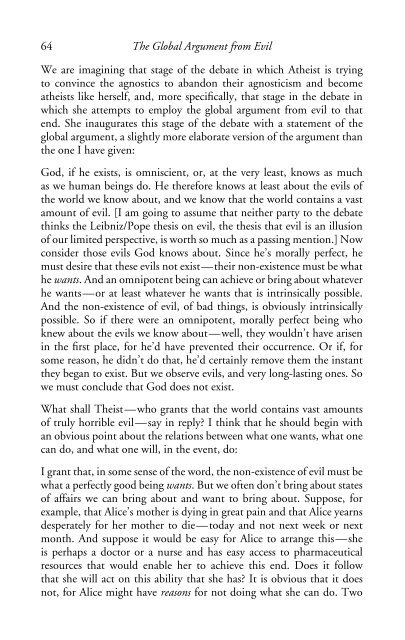The Problem of Evil - Common Sense Atheism
The Problem of Evil - Common Sense Atheism
The Problem of Evil - Common Sense Atheism
Create successful ePaper yourself
Turn your PDF publications into a flip-book with our unique Google optimized e-Paper software.
64 <strong>The</strong> Global Argument from <strong>Evil</strong><br />
We are imagining that stage <strong>of</strong> the debate in which Atheist is trying<br />
to convince the agnostics to abandon their agnosticism and become<br />
atheists like herself, and, more specifically, that stage in the debate in<br />
which she attempts to employ the global argument from evil to that<br />
end. She inaugurates this stage <strong>of</strong> the debate with a statement <strong>of</strong> the<br />
global argument, a slightly more elaborate version <strong>of</strong> the argument than<br />
the one I have given:<br />
God, if he exists, is omniscient, or, at the very least, knows as much<br />
as we human beings do. He therefore knows at least about the evils <strong>of</strong><br />
the world we know about, and we know that the world contains a vast<br />
amount <strong>of</strong> evil. [I am going to assume that neither party to the debate<br />
thinks the Leibniz/Pope thesis on evil, the thesis that evil is an illusion<br />
<strong>of</strong> our limited perspective, is worth so much as a passing mention.] Now<br />
consider those evils God knows about. Since he’s morally perfect, he<br />
must desire that these evils not exist—their non-existence must be what<br />
he wants. And an omnipotent being can achieve or bring about whatever<br />
he wants—or at least whatever he wants that is intrinsically possible.<br />
And the non-existence <strong>of</strong> evil, <strong>of</strong> bad things, is obviously intrinsically<br />
possible. So if there were an omnipotent, morally perfect being who<br />
knew about the evils we know about—well, they wouldn’t have arisen<br />
in the first place, for he’d have prevented their occurrence. Or if, for<br />
some reason, he didn’t do that, he’d certainly remove them the instant<br />
they began to exist. But we observe evils, and very long-lasting ones. So<br />
we must conclude that God does not exist.<br />
What shall <strong>The</strong>ist—who grants that the world contains vast amounts<br />
<strong>of</strong> truly horrible evil—say in reply? I think that he should begin with<br />
an obvious point about the relations between what one wants, what one<br />
can do, and what one will, in the event, do:<br />
I grant that, in some sense <strong>of</strong> the word, the non-existence <strong>of</strong> evil must be<br />
what a perfectly good being wants. But we <strong>of</strong>ten don’t bring about states<br />
<strong>of</strong> affairs we can bring about and want to bring about. Suppose, for<br />
example, that Alice’s mother is dying in great pain and that Alice yearns<br />
desperately for her mother to die—today and not next week or next<br />
month. And suppose it would be easy for Alice to arrange this—she<br />
is perhaps a doctor or a nurse and has easy access to pharmaceutical<br />
resources that would enable her to achieve this end. Does it follow<br />
that she will act on this ability that she has? It is obvious that it does<br />
not, for Alice might have reasons for not doing what she can do. Two
















